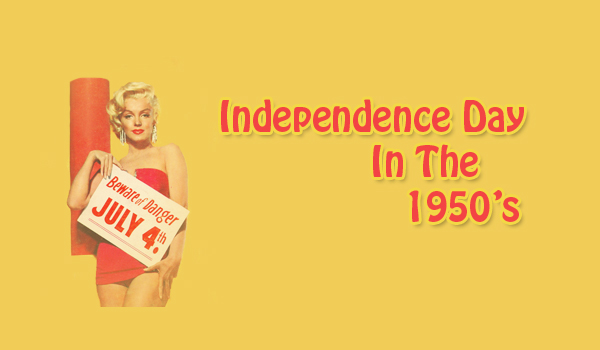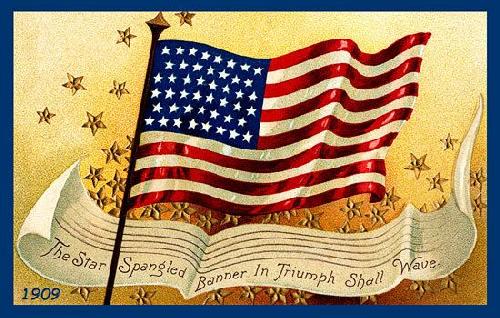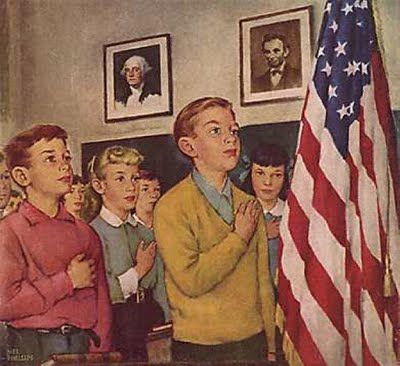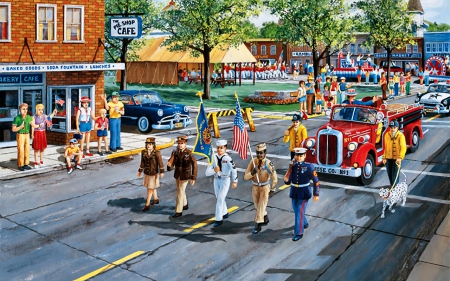 |
|
Independence
Day is regarded as the birthday of the United
States. The majority of Americans simply
call it the "Fourth of July," as it falls on
that same date every year. The tradition
of Independence Day celebrations goes back to
the 18th century and the American Revolution.
The fight for independence began In 1775 when
the people from New England began fighting the
British for their independence. On July 2,
1776, Congress secretly voted for independence
from Great Britain. Two days later on July
4, 1776 the Declaration of Independence was
approved and the document was published.
In 1880, Independence Day was made an unpaid
holiday for federal employees. In 1941,
Independence Day became a paid federal holiday. |
| |
|

|
Oh, say can you see by the dawn's early light
What so proudly we hailed at the twilight's last gleaming?
Whose broad stripes and bright stars thru the perilous
fight,
O'er the ramparts we watched were so gallantly streaming?
And the rocket's red glare, the bombs bursting in air,
Gave proof through the night that our flag was still there.
Oh, say does that star-spangled banner yet wave
O'er the land of the free and the home of the brave?
On the shore, dimly seen through the mists of the deep,
Where the foe's haughty host in dread silence reposes,
What is that which the breeze, o'er the towering steep,
As it fitfully blows, half conceals, half discloses?
Now it catches the gleam of the morning's first beam,
In full glory reflected now shines in the stream:
'Tis the star-spangled banner! Oh long may it wave
O'er the land of the free and the home of the brave!
And where is that band who so vauntingly swore
That the havoc of war and the battle's confusion,
A home and a country should leave us no more!
Their blood has washed out their foul footsteps' pollution.
No refuge could save the hireling and slave
From the terror of flight, or the gloom of the grave:
And the star-spangled banner in triumph doth wave
O'er the land of the free and the home of the brave!
Oh! thus be it ever, when freemen shall stand
Between their loved home and the war's desolation!
Blest with victory and peace, may the heav'n rescued land
Praise the Power that hath made and preserved us a nation.
Then conquer we must, when our cause it is just,
And this be our motto: "In God is our trust."
And the star-spangled banner in triumph shall wave
O'er the land of the free and the home of the brave!
Francis Scott Key
|
|
The history
of the Star Spangled banner is extremely
interesting. The lyrics were originally written
as a poem by a 35 year old lawyer and amateur
poet named Francis Scott Key. The immortal
poem was written by Key as he watched U.S.
soldiers who were under bombardment from British
naval forces during the war of 1812. He
watched as the soldiers raised a large American
flag over Fort McHenry in Baltimore, Maryland.
The following morning when Key saw the American
flag was still flying above Fort McHenry,
he felt compelled to write the poem, "Defence of
Fort M'Henry" which later became the
Star-Spangled Banner. In 1931 a
congressional resolution signed by President
Herbert Hoover made "The Star-Spangled Banner"
the U.S. national anthem. |
| |
|

The Pledge of Allegiance
I pledge Allegiance to the flag,
of the United States of America,
and to the Republic, for which it stands,
one nation, under God, indivisible,
with Liberty, and Justice for all. |
|
The history
of the Pledge of Allegiance is also quite
interesting. It was written in 1892 by the
socialist minister Francis Bellamy. In its
original form it read: "I pledge allegiance to my
Flag and the Republic for which it stands, one
nation, indivisible, with liberty and justice
for all." In 1923, the words, "the Flag of
the United States of America" were added.
In 1954, President Eisenhower encouraged
Congress to add the words "under God," creating
the 31 word pledge we say today. |
|
 |
|
Back in the
1950s the flag signified we were one nation, we
had a government with three equal parts, and we
were proud of our history! Kids were proud
to stand with their hand over their heart and
salute the flag as they recited the Pledge of
Allegiance. Americans were proud to stand
with their hand over their heart and sing the Star-Spangled-Banner. |
| |
|
 |
|
Patriotism
was at an all time high in the United States
during most of the 1950s. Local parades
were held in towns and cities across the U.S.
Kids rode bikes in local parades that they had spent days decorating
with red white and blue crepe paper. It was a day of family
celebrations with barbecues, picnics and
baseball games. Local Elks, Chamber of Commerce
and Lions Clubs held picnics for families that
included gunny sack races, tug-of-war games and
other outdoor activities. American flags
were seen flying at most homes and local
businesses all across the
Nation. The highlight of the day was always
the fireworks displays which started after dusk. |
|
|
|
 |
|
Fireworks
have been with Americans since our nation’s
beginning. Fireworks were part of the very
first Independence Day – a tradition that
continues every 4th of July. The first
commemorative Independence
Day fireworks were set off
on July 4, 1777.
Americans now
spend nearly $1 billion on fireworks each July
4th. |
|

Presidential Patriotic Quotes
|
|
“Your love
of liberty, your respect for the laws, your
habits of industry, and your practice of the
moral and religious obligations, are the
strongest claims to national and individual
happiness.”- George Washington, 1st
President
|
“The way to
secure liberty is to place it in the people’s
hands, that is, to give them the power at all
times to defend it in the legislature and in the
courts of justice.” - John Adams, 2nd
President |
|
"Posterity — you
will never know how much it has cost my
generation to preserve your freedom. I hope you
will make good use of it." - John Quincy Adams,
6th President
|
“No amount of
talking of what had been done in the Revolution
would have availed anything if you had not had
it in you to add to these great memories by the
deeds which were to make, in their turn, forever
memorable the years between the firing of Fort
Sumter and Appomattox. So we come here
together on the Fourth of July to see what a
great people we are; to see how well the
generations of our dead have done their duty.”
-Theodore Roosevelt, 26th President
|
"I would
rather belong to a poor nation that was free
than to a rich nation that had ceased to be in
love with liberty." - Woodrow Wilson, 28th
President
|
"Patriotism is
easy to understand in America. It means looking
out for yourself by looking out for your
country." - Calvin Coolidge, 30th President
|
|
“To the weary,
hungry, unequipped Army of the American
Revolution, the Fourth of July was a tonic of
hope and inspiration. So is it now. The
tough, grim men who fight for freedom in this
dark hour take heart in its message–the
assurance of the right to liberty under God–for
all peoples and races and groups and nations,
everywhere in the world.” - Franklin Roosevelt,
32nd President
|
“America was not
built on fear. America was built on courage, on
imagination and an unbeatable determination to
do the job at hand.” - Harry S. Truman, 33rd
President
|
|
“Freedom has
its life in the hearts, the actions, the spirit
of men and so it must be daily earned and
refreshed – else like a flower cut from its
life-giving roots, it will wither and die.” -
Dwight D. Eisenhower, 34th President
|
“And so, my
fellow Americans: ask not what your country can
do for you – ask what you can do for your
country. My fellow citizens of the world:
ask not what America will do for you, but what
together we can do for the freedom of man.” -
John F. Kennedy, 35th President
|
|
“Let the Fourth
of July always be a reminder that here in this
land, for the first time, it was decided that
man is born with certain God-given rights;
that government is only a convenience created
and managed by the people. With no powers of its
own except those voluntarily granted to it by
the people. We sometimes forget that great
truth, and we never should.” - Ronald Reagan,
40th President
|
“I believe
there’s an Almighty, and I believe the
Almighty’s great gift to each man and woman in
this world is the desire to be free. This
isn’t America’s gift to the world, it is a
universal gift to the world, and people want to
be free.” - George W. Bush, 43rd President
|
“When you
open your heart to patriotism, there is no room
for prejudice. The Bible tells us how good and
pleasant it is when God’s people live together
in unity. We must speak our minds openly, debate
our disagreements honestly, but always pursue
solidarity.” - Donald J. Trump, 45th President
|
|
Vintage Independence Day Postcards |
|

|

|
 |
|